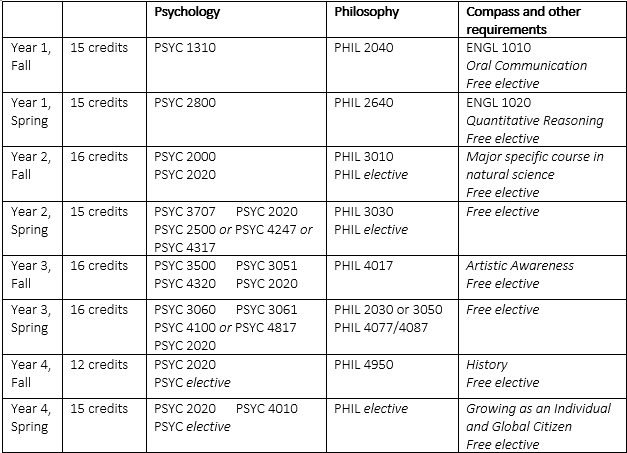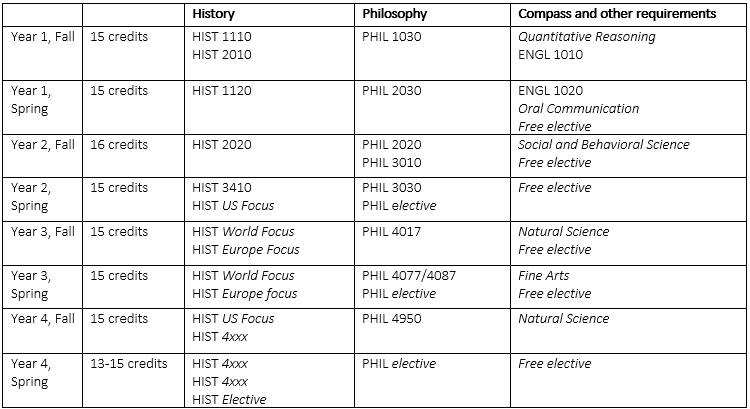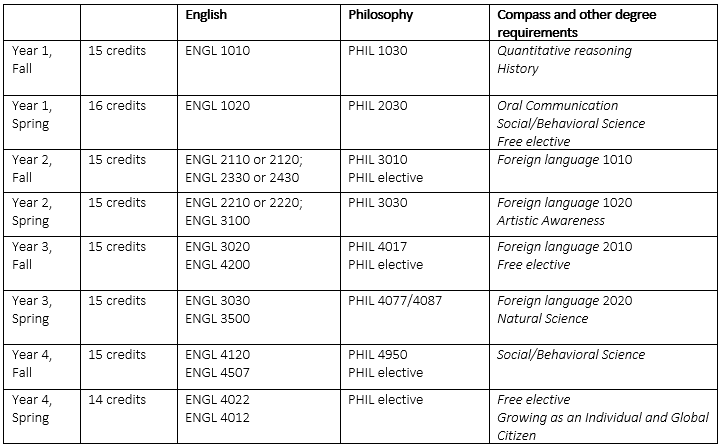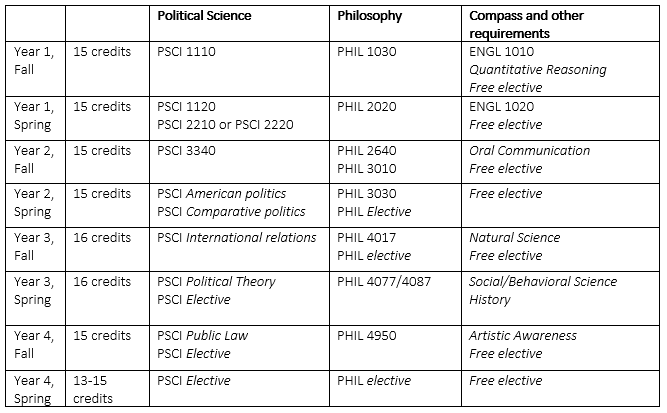Double Majors
Many students benefit from combining a philosophy major with a second field of study. In the past, our students have combined philosophy with degrees in psychology, theatre, history, English, and economics, among others.
There are several reasons to carefully consider a double major if your program of study allows for it. Since philosophy is concerned with fundamental questions, it offers insight into the general concepts and methods of inquiry that other disciplines utilize. Since its questions and goals often overlap with those of other disciplines, students benefit from gaining the perspectives of each field. Finally, philosophy develops keen critical thinking and communication skills, which students find advantageous when studying disciplines outside philosophy. Talk to an advisor about potential pathways to a double-major!
Here are some examples of how you might study philosophy as part of a double major.
Double Major - Philosophy and Psychology
Why Double Major in Philosophy and Psychology?
Philosophers have been fascinated by questions about the human mind since long before the word psychology was first uttered. How are the mind and body related? How does something physical (like the brain) give rise to sensations (like pain), or intentions, desires, and emotions? Are we born with innate knowledge? What does it mean to believe, or think, or feel fear or joy? Anyone interested in such questions will benefit from studying both philosophical and psychological approaches.
But philosophy and psychology are each also more broadly concerned with understanding the human condition, our place in the world, our motives, experiences, feelings, and responsibilities. Those who pursue a double major in philosophy and psychology are guaranteed a richer understanding of what it is to be human.
Psychology emerged as an important scientific discipline during the late 19th century, but those who we identify as philosophers have been interested in questions about the human mind since antiquity. Early psychologists were influenced by philosophers like Rene Descartes, David Hume, John Stuart Mill and Baruch Spinoza. Philosophy can be regarded as having spawned psychology.
Over the last century, the spectacular successes of psychology have helped create clearer distinctions between the disciplines. Nevertheless, with so much shared history, and so many shared interests, it is little wonder that a double major in philosophy and psychology can bring such rich rewards.
Double Major Requirments
The requirements for a double major in philosophy and psychology can all be satisfied within 120 student credit hours. The following four-year plan assumes that students are pursuing a Bachelor of Science degree in both Philosophy and Psychology, with concentrations in general philosophy and general psychology. The departments of philosophy and psychology also offer the Bachelor of Arts degree and, for both BS and BA degrees, a variety of alternative concentrations. Students are invited to visit department websites to learn more about the many options available, or to talk to department advisors about potential pathways to a double-major.

For more information about studying Psychology at ETSU, please visit here.
Double Major - Philosophy and History
Why Double Major in Philosophy and History?
As partners in the humanities, the interests and methods of historians and philosophers often overlap. We can't understand historical events and peoples well without understanding the ideas that motivated them. We better understand the ideas themselves if we attend to the historical contexts in which they developed. Philosophy is centrally concerned with the history of ideas, but many other philosophical subdisciplines also draw on historical research and analysis for purposes of understanding important aspects of human diversity. Many philosophers of science, for example, contend that the history of science provides important insights into the nature of science and how it makes progress.
Political philosophers, environmental philosophers, and feminists, as well as philosophers of race, religion, and art, also often draw on historical examples and themes. A double major in history and philosophy equips students with valuable skills, which help them better appreciate the significance of key events, people, and ideas, that have collectively shaped the modern world.
Philosophy has been described as one long conversation. Philosophers respond to the questions, ideas, puzzles, and arguments, that previous philosophers introduce, analyze, and discuss. Philosophers pay close attention to argument structure, the plausibility of assumptions, and the definitions of terms, but philosophers are also very aware that we can better understand core ideas, debates, and disagreements if we better understand where they came from, when they were first proposed, by whom, and with what assumptions and purpose in mind.In order to evaluate philosophical ideas, in other words, it is helpful to understand the historical and social contexts in which they were both proposed and developed. As such, philosophy and history are inescapably intertwined.
Double Major Requirments
The requirements for a double major in Philosophy and History can all be satisfied within 120 student credit hours. The following four-year plan assumes that students are pursuing a Bachelor of Science in both Philosophy and History. The following plan also assumes that students pursue the general concentration within the philosophy major, but this could easily be substituted for either the philosophy concentration in religious studies, or justice, ethics and law. Students are invited to visit department websites to learn more about the many options available, or talk to an advisor about potential pathways to a double-major.

For more information about studying History at ETSU, please visit here.
Double Major - Philosophy and English
Why Double Major in Philosophy and English
Studying literature and philosophy deepens our understanding of the human experience, exposes us to diverse cultures, ideas, and perspectives, and in the process creates better critical thinkers and more effective communicators. The philosophy of language is also a significant subdiscipline within modern philosophy. Our use of language has significant implications for philosophical discussion in metaphysics, epistemology, logic, and aesthetics.
Philosophy and English majors each focus on the careful use of language for purposes of understanding and communicating ideas. Philosophy emphasizes clear definitions of terms and the analysis and development of arguments, while English majors pay closer attention to style, voice, audience, and genre. The focused study of each discipline is an excellent complement to the other.
Many important philosophical themes, including justice, morality, politics, beauty, meaning, and freedom, are also central themes for the great writers of fiction, poetry, and theatre. Novelists, poets and other creative writers are keen observers of human behavior and help us better appreciate the range of human emotions, motives and frustrations, which is beneficial to many philosophical projects. The philosopher’s approach differs in important respects, placing more emphasis on argumentative structures, plausibility of assumptions, and definition of terms. These differences ensure that students who double major in philosophy and English will achieve a more rounded, liberal arts education.
Double Major Requirments
The requirements for a double major in philosophy and English can all be satisfied within 120 student credit hours. The following four-year plan assumes that students are pursuing the Bachelor of Arts in both Philosophy and English. The upper-level courses for English, listed here, are just examples. The Department of Literature and Language offers a much wider range of courses that can satisfy degree requirements. The following plan also assumes that students pursue the general concentration within the philosophy major, but this could easily be substituted for either the philosophy concentration in religious studies, or justice, ethics and law. Students are invited to visit department websites to learn more about the many options available, or talk to a department advisor about potential pathways to a double-major.

For more information about studying English at ETSU, please visit here.
Double Major - Philosophy and Political Science
Why Double Major in Philosophy and Political Science?
A double major in philosophy and political science is particularly well-suited for students who want to combine political analysis with philosophical insight. This program of study would be an excellent choice for students who are interested in better understanding political systems, models of representation, comparative politics, as well as concepts such as equality and political and social justice.
Political philosophy is an important subdiscipline of philosophy, concerned with better understanding how public power can be used to maximize the quality of life of those who are affected by governments, public policies, and political actions. Political philosophy is primarily interested in how political organizations ought to function, and is thus less concerned with describing how political decisions are made. Nevertheless, political philosophies must be appropriately informed by the systems of government that exist and have existed, as well as the consequences of implanting different systems. For students interested in political science, a double major with philosophy promises important benefits that neither discipline can offer on its own.
Double Major Requirments
The requirements for a double major in Philosophy and Political Science can all be satisfied within 120 student credit hours. The following four-year plan assumes that students are pursuing the BS in both Philosophy and Political Science. The following plan also assumes that students pursue the general concentration within the philosophy major, but this could easily be substituted for either the philosophy concentration in religious studies, or justice, ethics and law. The Department of Political Science offers a wide range of courses that can satisfy the italicized categories and the Philosophy Department offers many courses that can be used as electives. Students are invited to visit department websites to learn more about the many options available, or talk to a department advisor about potential pathways to a double-major.

For more information about studying Political Science at ETSU, please visit
 Sam Wilson West Parking Lot C...
Sam Wilson West Parking Lot C...